2020年中考仁爱版英语八年级词汇句型考点大全
文档属性
| 名称 | 2020年中考仁爱版英语八年级词汇句型考点大全 | 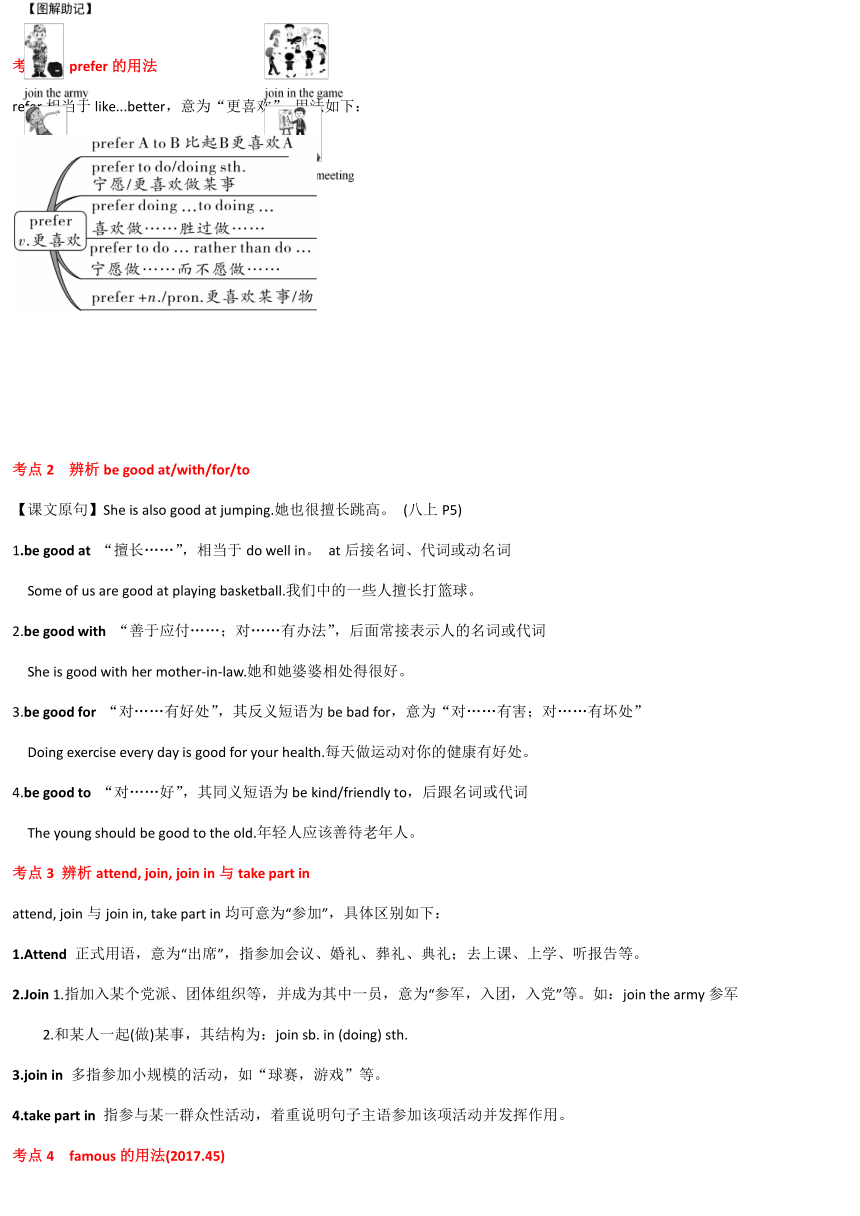 | |
| 格式 | zip | ||
| 文件大小 | 3.1MB | ||
| 资源类型 | 教案 | ||
| 版本资源 | 仁爱科普版 | ||
| 科目 | 英语 | ||
| 更新时间 | 2020-02-28 22:22:55 | ||
图片预览

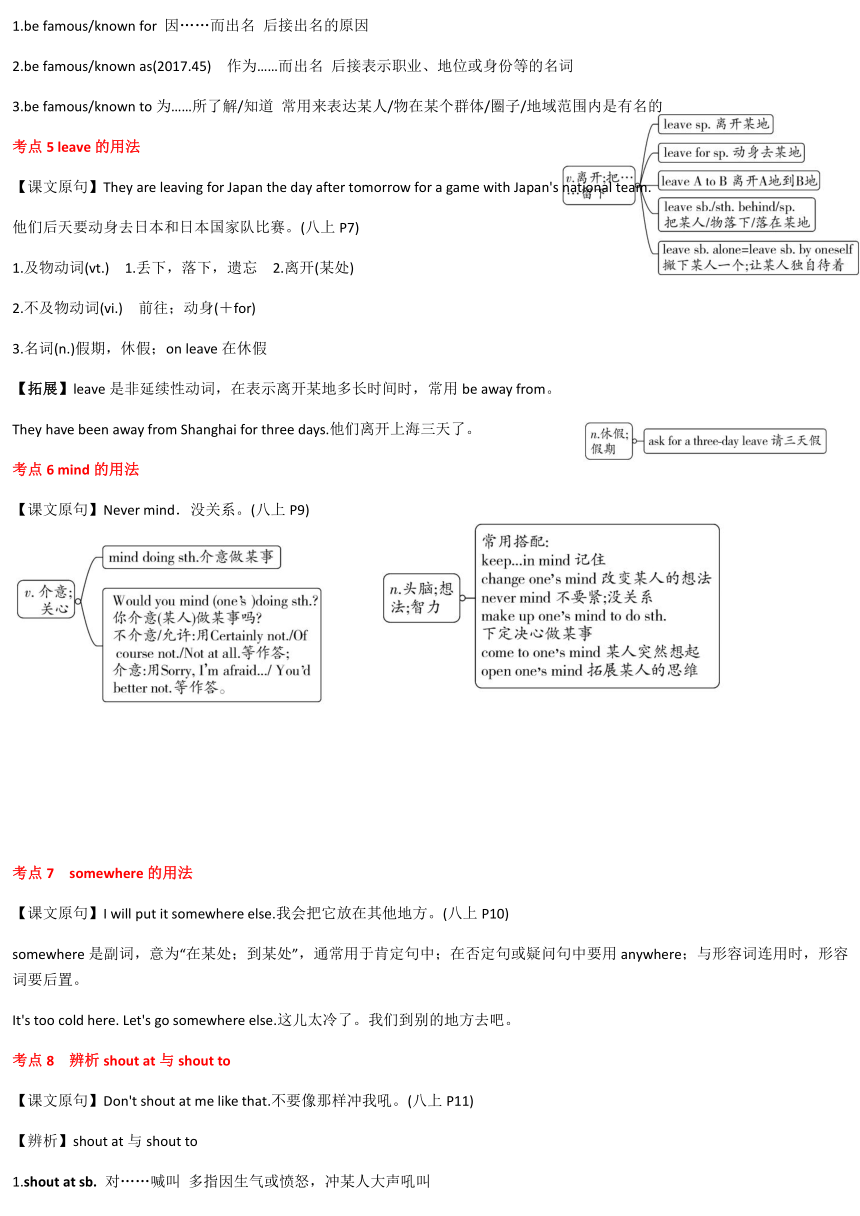
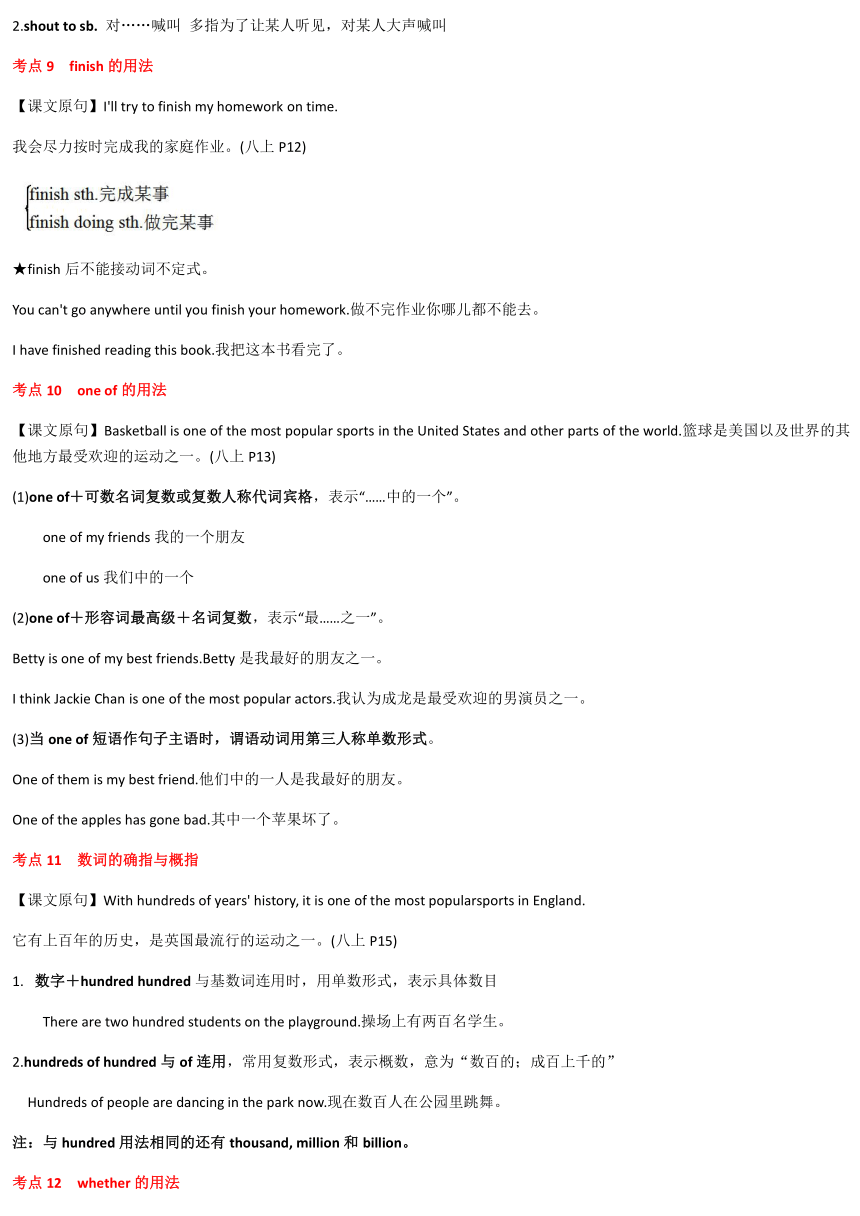
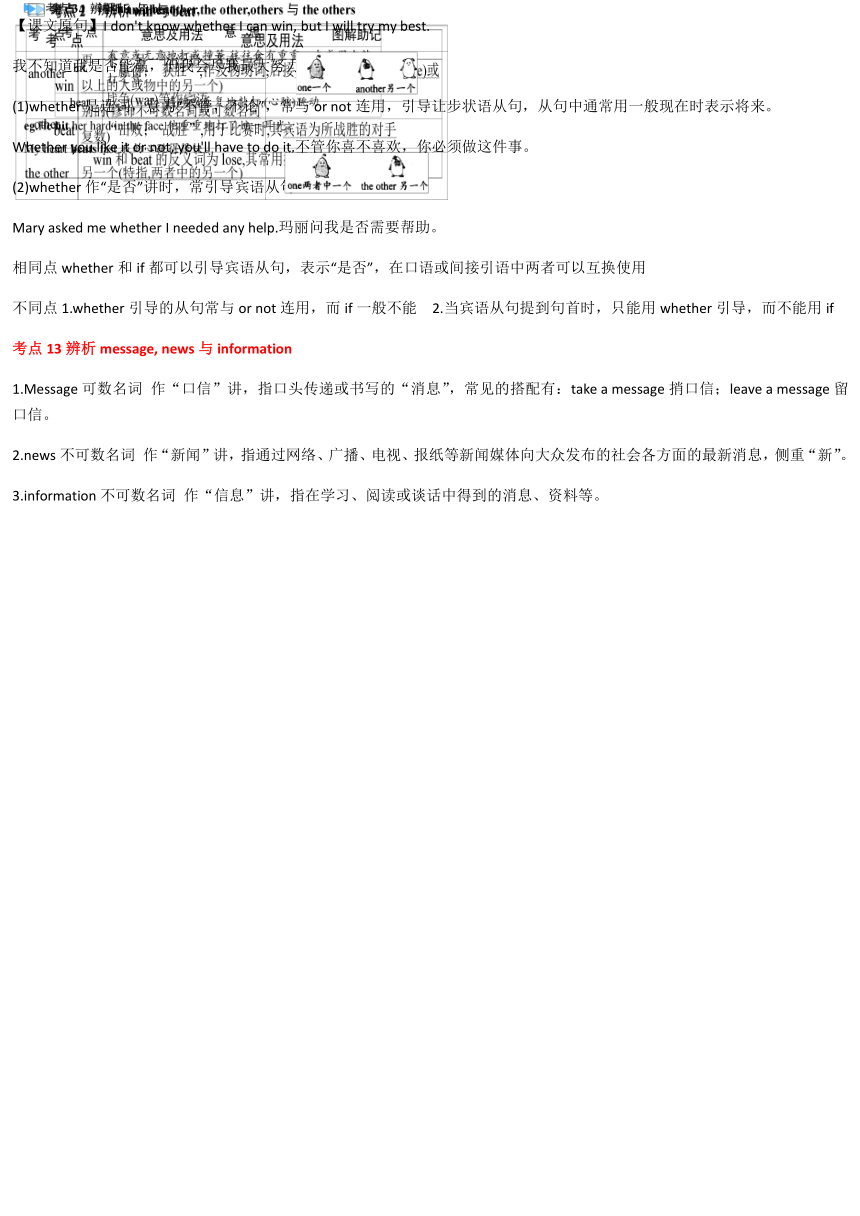
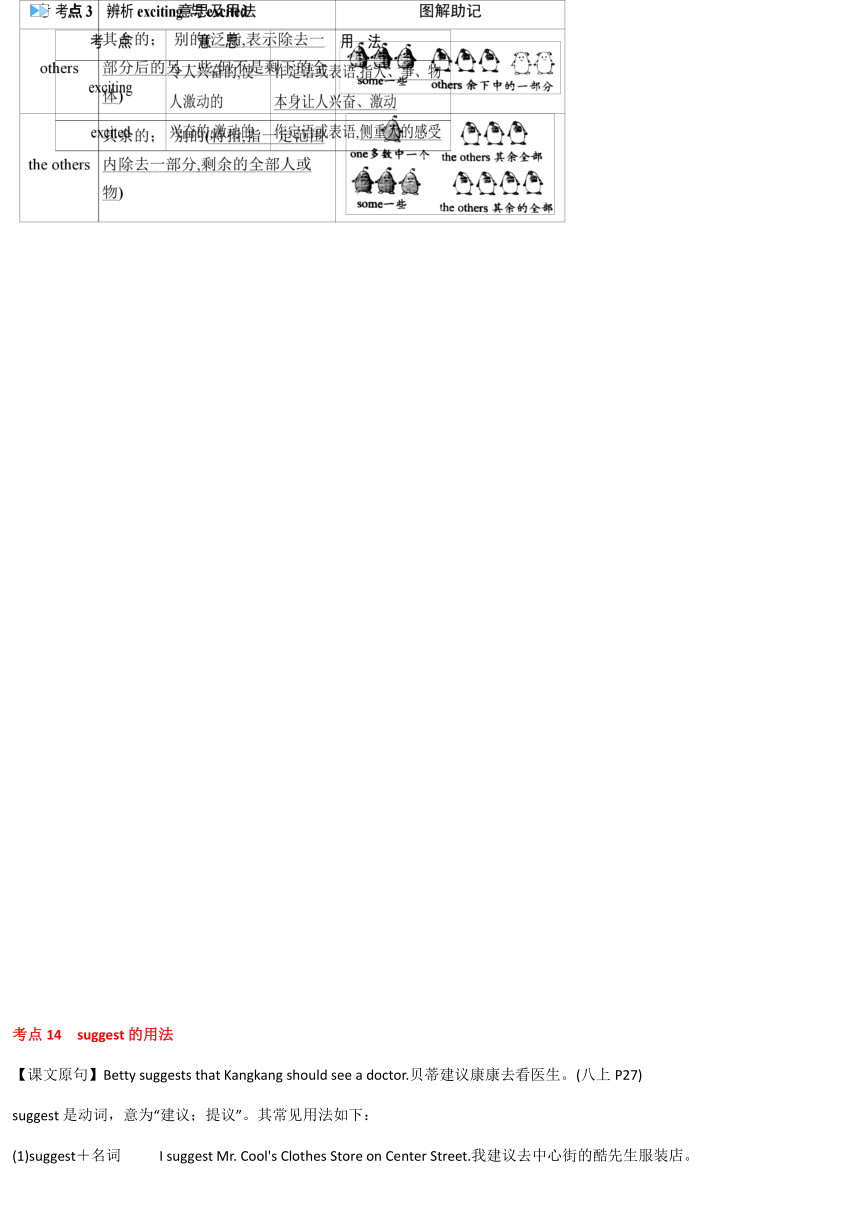
文档简介
考点1 prefer的用法
refer相当于like...better,意为“更喜欢”。用法如下:
考点2 辨析be good at/with/for/to
【课文原句】She is also good at jumping.她也很擅长跳高。 (八上P5)
1.be good at “擅长……”,相当于do well in。 at后接名词、代词或动名词
Some of us are good at playing basketball.我们中的一些人擅长打篮球。
2.be good with “善于应付……;对……有办法”,后面常接表示人的名词或代词
She is good with her mother?in?law.她和她婆婆相处得很好。
3.be good for “对……有好处”,其反义短语为be bad for,意为“对……有害;对……有坏处”
Doing exercise every day is good for your health.每天做运动对你的健康有好处。
4.be good to “对……好”,其同义短语为be kind/friendly to,后跟名词或代词
The young should be good to the old.年轻人应该善待老年人。
考点3 辨析attend, join, join in与take part in
attend, join与join in, take part in均可意为“参加”,具体区别如下:
1.Attend 正式用语,意为“出席”,指参加会议、婚礼、葬礼、典礼;去上课、上学、听报告等。
2.Join 1.指加入某个党派、团体组织等,并成为其中一员,意为“参军,入团,入党”等。如:join the army参军
2.和某人一起(做)某事,其结构为:join sb. in (doing) sth.
3.join in 多指参加小规模的活动,如“球赛,游戏”等。
4.take part in 指参与某一群众性活动,着重说明句子主语参加该项活动并发挥作用。
考点4 famous的用法(2017.45)
1.be famous/known for 因……而出名 后接出名的原因
2.be famous/known as(2017.45) 作为……而出名 后接表示职业、地位或身份等的名词
3.be famous/known to为……所了解/知道 常用来表达某人/物在某个群体/圈子/地域范围内是有名的
考点5 leave的用法
【课文原句】They are leaving for Japan the day after tomorrow for a game with Japan's national team.
他们后天要动身去日本和日本国家队比赛。(八上P7)
1.及物动词(vt.) 1.丢下,落下,遗忘 2.离开(某处)
2.不及物动词(vi.) 前往;动身(+for)
3.名词(n.)假期,休假;on leave在休假
【拓展】leave是非延续性动词,在表示离开某地多长时间时,常用be away from。
They have been away from Shanghai for three days.他们离开上海三天了。
考点6 mind的用法
【课文原句】Never mind.没关系。(八上P9)
考点7 somewhere的用法
【课文原句】I will put it somewhere else.我会把它放在其他地方。(八上P10)
somewhere是副词,意为“在某处;到某处”,通常用于肯定句中;在否定句或疑问句中要用anywhere;与形容词连用时,形容词要后置。
It's too cold here. Let's go somewhere else.这儿太冷了。我们到别的地方去吧。
考点8 辨析shout at与shout to
【课文原句】Don't shout at me like that.不要像那样冲我吼。(八上P11)
【辨析】shout at与shout to
1.shout at sb. 对……喊叫 多指因生气或愤怒,冲某人大声吼叫
2.shout to sb. 对……喊叫 多指为了让某人听见,对某人大声喊叫
考点9 finish的用法
【课文原句】I'll try to finish my homework on time.
我会尽力按时完成我的家庭作业。(八上P12)
★finish后不能接动词不定式。
You can't go anywhere until you finish your homework.做不完作业你哪儿都不能去。
I have finished reading this book.我把这本书看完了。
考点10 one of的用法
【课文原句】Basketball is one of the most popular sports in the United States and other parts of the world.篮球是美国以及世界的其他地方最受欢迎的运动之一。(八上P13)
(1)one of+可数名词复数或复数人称代词宾格,表示“……中的一个”。
one of my friends我的一个朋友
one of us我们中的一个
(2)one of+形容词最高级+名词复数,表示“最……之一”。
Betty is one of my best friends.Betty是我最好的朋友之一。
I think Jackie Chan is one of the most popular actors.我认为成龙是最受欢迎的男演员之一。
(3)当one of短语作句子主语时,谓语动词用第三人称单数形式。
One of them is my best friend.他们中的一人是我最好的朋友。
One of the apples has gone bad.其中一个苹果坏了。
考点11 数词的确指与概指
【课文原句】With hundreds of years' history, it is one of the most popularsports in England.
它有上百年的历史,是英国最流行的运动之一。(八上P15)
数字+hundred hundred与基数词连用时,用单数形式,表示具体数目
There are two hundred students on the playground.操场上有两百名学生。
2.hundreds of hundred与of连用,常用复数形式,表示概数,意为“数百的;成百上千的”
Hundreds of people are dancing in the park now.现在数百人在公园里跳舞。
注:与hundred用法相同的还有thousand, million和billion。
考点12 whether的用法
【课文原句】I don't know whether I can win, but I will try my best.
我不知道我是否能赢,但我会尽我最大努力。(八上P22)
(1)whether是连词,意为“不管,不论”,常与or not连用,引导让步状语从句,从句中通常用一般现在时表示将来。
Whether you like it or not, you'll have to do it.不管你喜不喜欢,你必须做这件事。
(2)whether作“是否”讲时,常引导宾语从句。
Mary asked me whether I needed any help.玛丽问我是否需要帮助。
相同点whether和if都可以引导宾语从句,表示“是否”,在口语或间接引语中两者可以互换使用
不同点1.whether引导的从句常与or not连用,而if一般不能 2.当宾语从句提到句首时,只能用whether引导,而不能用if
考点13辨析message, news与information
1.Message可数名词 作“口信”讲,指口头传递或书写的“消息”,常见的搭配有:take a message捎口信;leave a message留口信。
2.news不可数名词 作“新闻”讲,指通过网络、广播、电视、报纸等新闻媒体向大众发布的社会各方面的最新消息,侧重“新”。
3.information不可数名词 作“信息”讲,指在学习、阅读或谈话中得到的消息、资料等。
考点14 suggest的用法
【课文原句】Betty suggests that Kangkang should see a doctor.贝蒂建议康康去看医生。(八上P27)
suggest是动词,意为“建议;提议”。其常见用法如下:
(1)suggest+名词 I suggest Mr. Cool's Clothes Store on Center Street.我建议去中心街的酷先生服装店。
(2)suggest doing sth. We suggested putting off the sports meeting.我们建议将运动会延期。
(3)suggest+that从句从句谓语用“(should+)动词原形”。
We suggested that he (should) go and make an apology to his teacher.我们建议他去向老师道歉。
(4)suggest后不能接双宾语,没有“suggest sb.sth.”和“suggest (sb.) to do sth.”的搭配。
(5)suggest的名词形式是suggestion,意为“建议”,是可数名词。
考点15 enough的用法
【课文原句】drink enough boiled water 喝足够多的开水(八上P28)
(1)enough作形容词时,意为“足够的,充足的,充分的”,放在所修饰的名词之前或之后均可。
I don't have enough money/money enough to buy a computer.我没有足够的钱买电脑。
(2)enough也可作副词,意为“足够地”,修饰形容词或副词,并放在其后。
quickly enough足够快 clever enough足够聪明
【巧学妙记】enough修饰名词、形容词、副词的位置:
(3)若enough前出现否定词,则不仅否定了enough,而且也否定了其后的动词不定式。
He was not strong enough to do the work.他不够强壮,不能做这项工作。
(4)enough to可以与so... that结构转换。
He is rich enough to buy a plane.=He is so rich that he can buy a plane.他很有钱,可以买一架飞机。
(5)enough to可以与too... to句型转换。
He is too young to go to school.=He is not old enough to go to school.他不够大,不能去上学。
考点16 lie的用法
【课文原句】You'd better lie down and have a rest.你最好躺下休息。(八上P30)
(1)lie down意为“躺下”;lie是动词,意为“躺;平躺”。
(2)lie, lay的一词多义
原形 释义 过去式 过去分词 现在分词
lie(vi.) 躺;位于 lay lain lying
lie(vi.) 说谎 lied lied lying
lay(vt.) 放置;下蛋 laid laid laying
The man lying there lied that he had laid the money on the table.躺在那里的那个人撒谎说他把钱放在桌子上了。
考点17 What's the matter?句型
1.“What‘s the matter?”意为“怎么了?”,常用来询问身体有什么不适,也可以用来询问某物出了什么故障。后面可接with sb./sth.,表示“某人/某物怎么了?”。
【归纳】(1)询问“某人怎么了?”的句型:
2.对于“What’s wrong/the matter(with sb.)?”的答语常用“have+a+表示疾病或病痛的名词”回答:
3.得知某人生病或住院后,常用“I’m sorry to hear that.”来回答。
辨析too many, too much与much too
too much太多的 中心词是much,后面跟不可数名词 too much water太多的水
too many太多的 中心词是many,后面跟可数名词复数 too many students太多的学生
much too非常;太 中心词是too,后面跟形容词或副词 much too heavy太重了
考点18 without的用法
(1)without 是介词,意为“没有”,后面跟名词、代词或动名词,一起构成介词短语。
(2)without 表示“没有”时,表条件,相当于一个条件状语从句。
【拓展】without的反义词为with,意为“有”。
考点19 give up 的用法
(1)give up后接名词、代词或v.?ing形式作宾语。若接代词作宾语,代词要放在give和up之间,且代词要用其宾格形式。
(2)后接v.?ing形式作宾语的动词(短语):
look forward to doing sth.期待做某事
be used to doing sth.习惯于做某事
feel like doing sth.想做某事
can't help doing sth.情不自禁做某事
put off doing sth.推迟做某事
finish doing sth.做完某事
consider doing sth.考虑做某事
keep on doing sth.继续/坚持做某事
enjoy doing sth.喜欢做某事
考点20 surprised 的用法
(1)surprised用法小结:
(2)surprise n.“惊讶”。常用搭配有:
in surprise惊讶地; 惊奇地
to one's surprise使某人感到惊讶的是
give sb.a surprise 给某人一个惊喜
考点21 happen的用法
【课文原句】But sometimes accidents can happen, so try to stay safe when you play them.但是有时候可能会发生意外,因此,当你运动时,一定要注意安全。(八上P47)
happen是不及物动词,意为“发生”,主要有以下三种用法:
1.“sth.+happen+地点/时间”意为“某地/某时发生了某事”
2.“sth.+happen+to+sb.”意为“某人出了某事(常指不好的事)”
3.“sb.+happened+to do sth.=It happened that...”意为“某人碰巧做某事”
(2)happen和take place的用法区别
happen用于偶然或突发性事件;take place指事件的发生有提前安排。
When did the terrible accident happen?这场惨烈的事故是什么时候发生的?
The next meeting will take place on Thursday.下次会议将在星期四举行。
考点22 on the one hand... on the other hand...
【课文原句】On the other hand, you may feel ill if you are always unhappy.另一方面如果你总是不开心的话,可能会感觉到自己不健康。(八上P47)
on the other hand用于引出不同的(尤指对立的)观点、思想等。
On the one hand, a lot of people go to the US, but on the other hand, a lot of people come back from there.一方面,许多人前往美国;另一方面,很多人又从那回来。
考点23 辨析except, besides, except for, but
【课文原句】Starting in 1896,the Olympic Games were held every four years except during the World War ⅠandⅡ.自1896年开始,奥运会每四年举办一次,除了第一次世界大战和第二次世界大战期间。(八上P53)
【辨析】except, besides, except for, but四者都有“除……之外”的意思,具体区别如下:
1.except表示一种排除关系,except后跟内容(与整体是同类)不包括在内,常与all, everyone等不定代词连用
We all went to the park last Sunday except Jane.除了简以外,上个星期天我们都去公园了。
2.besides“除……之外,还有……”,表示一种累加关系,besides后跟的内容包括在内
Amy is good at dancing besides singing.除唱歌外,艾米还擅长跳舞。
3.except for说明整体情况后,对细节加以修正,指从整体中去除一个细节(与整体不是同类),表示“美中不足的是”
Your writing is good except for a few grammar mistakes.除了几处语法错误,你的作文写得很好。
but常与nobody/nothing/no one等表示否定意义的不定代词连用,与except同义
Nobody knew his name but/except me.除了我之外,没人知道他的名字。
注:(1)besides还可以作副词,意为“而且;此外”。 (2)except还可以作连词,意为“除了;只是”,后接从句。
考点24 辨析instead与instead of
Instead 反而;代替 副词 (1)位于句尾。如:句子+instead (2)如果位于句首时常用逗号与后面隔开。即:Instead,+句子
instead of代替;而不是 介词 在句中的位置比较灵活,其后经常跟名词、代词、动词ing形式。即:instead of+宾语
考点25 感叹句结构
【课文原句】What beautiful stamps!多么漂亮的邮票啊!(八上P57)
(1)what引导的感叹句
①What+a/an+adj.+可数名词单数(+主语+谓语)!
What a nice gift it is!它是一件多么漂亮的礼物啊!
②What+adj.+可数名词复数(+主语+谓语)!
What beautiful socks they are!多么漂亮的袜子啊!
③What+adj.+不可数名词(+主语+谓语)!
What nice weather it is!天气多好啊!
(2)how引导的感叹句
How+adj./adv.+主语+谓语!
How pretty the dragon boats are!多么漂亮的龙舟啊!
考点26 辨析与used to相关的短语
【课文原句】I used to collect baseball cards.我过去常常收集棒球卡。(八上P57)
used to do sth.过去常常做某事(to为动词不定式符号)只用于过去时态,暗示现在不做了
be/get usedto (doing) sth.习惯于(做)某事(to是介词,后接名词、代词或动名词)
be used to do sth.(be used for doing sth.)被用来做某事(动词不定式作目的状语;for短语表示用途)
be used as sth.被用作……(as意为“作为”)
be used by sb.被某人使用(by后是动作的执行者)
考点27 wonder的用法
考点28 “so...that...”句型
【课文原句】He learned so quickly that his father was so happy.他学得如此快,他父亲很开心。(八上P67)
so... that引导结果状语从句,意为“如此……以至于”。so为副词,修饰形容词或副词;that后跟从句。其句型结构主要有:
【拓展】such... that...也作“如此……以至于……”讲,但such后面要用名词。其结构如下:
考点29 agree的用法
【课文原句】I don't agree.我不同意。(八上P73)
agree with 1.表示同意某人或某人的意见、想法、分析、解释等(即持同一观点)
2.表示“(食物、天气、工作等)对……适宜”
3.表示“与……一致”
agree to 1.“agree to+名词”表示同意某事 2.“agree to+动词原形”表示同意做某事
agree on 1.主要指通过协商而取得一致意见或达成协议 2.agree on+动名词=agree to+动词原形
考点30 dead的用法
【课文原句】On the morning of the new year, the girl was lying against the wall, dead.在新年的早晨,那个女孩躺在墙边,死了。(八上P75)
(1)dead作形容词,意为“死的;失去生命的”。
My father has been dead for ten years.我父亲已经去世10年了。
We should cut down the dead trees.我们应该砍掉那些死树。
(2)【辨析】“死”得其所
1.dead形容词,意为“死的”,用来作表语或定语
Though he is dead, he is still alive in our heart.尽管他死了,但他仍然活在我们心中。
2.die不及物动词,是非延续性动词
The poor man died three years ago.那个可怜的人3年前去世了。
3.death名词,意为“死亡”
His death made us very sad.他的死让我们很伤心。
4.dying die的现在分词,也可用作形容词,表示“垂死的;要死的”,常用作定语
The doctor tried to save the dying boy.那个医生努力抢救这个生命垂危的男孩
扩展1.die from死于(外因,主要指事故方面),如:die from a traffic accident/an earthquake死于交通事故/地震
2.die of死于(内因,主要指疾病等自然原因),如:die of illness死于疾病
3.die out灭绝;消失,如:How did the dinosaurs die out?恐龙是如何灭绝的?
考点31 be fond of 的用法
1.be fond of 意为“喜欢”,后接名词、代词或动名词。
2.be fond of sb./sth.“喜欢某人/某物”
3.be fond of doing sth.“喜欢做某事”
eg.I'm fond of making dolls.我喜欢做布娃娃。
We have been fond of the house and don't want to leave.我们已经喜欢上了这座房子,不想离开。
考点32 辨析offer,give与provide
eg.They decide to offer Joe the job.=They decide to offer the job to Joe.
他们决定向Joe提供这份工作。
My friend gave me a notebook yesterday.我朋友昨天给了我一个笔记本。
The school canteen provides us with breakfast.=The school canteen provides breakfast for us.学校餐厅给我们提供早餐。
考点33 feed的用法
【课文原句】They feed on bamboo.(八上P87)
(1)feed... to... 意为“把……喂给……吃”。
Please feed some grass to the cow.请给牛喂点草。
(2)feed... on/with...意为“用……喂……”。on后接表示食物或饲料的名词,on可与with替换。
She feeds the baby on/with milk.她用牛奶喂婴儿。
(3)feed on... 意为“以……为食,靠……为生”。on后通常接表示食物或饲料的名词。
Owls feed on mice and other small animals.猫头鹰以老鼠和其他小动物为食。
考点34 turn的相关短语
【课文原句】turn off the gas and lights 关掉燃气和灯(八上P94)
(1)turn off意为“断掉(电流、煤气、水等);关闭”。宾语是代词时,要放在turn和off之间。
Please turn off the light.请关上灯。
You must turn off the light when you go to bed.你睡觉时必须关灯。
I can't hear the radio. Could you please turn it up a little? 我听不见收音机的声音。你能调大声一点儿吗?
Do you mind turning down the music?你介意把音乐声调小一点儿吗?
【辨析】turn on与open, turn off与close
考点35 find out/information的用法
【课文原句】Mm, let me find out the information online.嗯,让我了解世界上正在发生什么事。(八上P97)
(1)【辨析】find out, find, look for
1.find out指通过分析、询问、思考等弄清楚、查明白
2.find宾语是丢失的人或物,强调找到的结果
3.look for有目的地“找”,强调找的过程,但不一定找到
Please find out where they live.请查清他们住哪儿。
I can't find the car key.我找不到车钥匙了。
I'm looking for Steve. Have you seen him?我在找史蒂夫。你见过他吗?
(2)information是不可数名词,意为“消息;信息”,通常不与冠词连用。表示“一条信息”用a piece of information;“两条信息”用two pieces of information。
I don't have any information about it.我没有这方面的信息。
He asked me for some information.他向我索取了一些信息。
(3)【辨析】information, news与message
1.information不可数名词,意为“信息”,通常指在阅读、观察、谈话或书信往来中特别关注的消息、情报、资料等
2.news不可数名词,意为“新闻;消息”,指公众感兴趣的、近来发生的事情,尤其指通过广播、电视、网络等报道的事件
3.message可数名词,一般指口头传递或书写的“音信”
考点36 “疑问词+动词不定式”的用法
【课文原句】For example, at online grammar websites, there is advice about how to correct your English grammar.例如,在语法网站上,有一些关于如何纠正你的英语语法的建议。(八上P103)
本句中how to correct your English grammar是“疑问词+动词不定式”结构,作介词about的宾语。“疑问词+动词不定式”结构还常在句中作主语、宾语补足语、表语等。
Where to go is a problem.去哪里是一个问题。(主语)
I know where to find the key.我知道在哪儿找到钥匙。(宾语)
The question is how to learn English well.问题是如何学好英语。(表语)
考点37 invite的用法
【课文原句】My father and mother want to invite your parents to go to the movies.我的父母想邀请你们的父母一起去看电影。(八下P1)
invite+sb.+to do sth. 邀请某人做某事 They've invited us to stay for the weekend.他们已邀请我们留下来过周末。
invite+sb.+to 某地邀请某人到某处 Jim invited his friends to his house.吉姆邀请了他的朋友们去他家。
【拓展】invite的名词形式为invitation, 意为“邀请;请柬”,常用作可数名词,常用搭配如下:
make/accept an invitation发出/接受邀请
turn down an invitation拒绝邀请
an invitation to sth.……的邀请
考点38 感官动词的用法
【课文原句】How do the flowers smell?这些花闻起来怎么样?(八下P2)
(1)smell为感官系动词,意为“闻起来”,后接形容词或名词(短语)作表语,说明闻的感受。类似的感官系动词还有look(看起来),taste(尝起来),sound(听起来),feel(摸起来;感觉)等。
(2)【辨析】sound, noise与voice
sound作名词表示“声音”时,是自然界各种声音的总称
noise专指“噪音”或“不悦耳的声音”
voice指“说话声”或“嗓音”
Sound travels slower than light.声音比光传播得慢。
There is so much noise in this restaurant. I can hardly hear you talking.这个餐厅太吵了,我几乎听不到你说话。
I didn't recognize her voice on the telephone.在电话里,我没听出她的声音。
考点39 seem的用法
【课文原句】He seems a little unhappy.他好像有一点不开心。(八下P3)
考点40 however的用法
【课文原句】However, more young people are becoming interested in it nowadays.然而,如今更多的年轻人对它越来越感兴趣。(八下P7)
however是副词,意为“然而;不过”,表示转折。位于句首时,后面要加逗号;位于句中时,前后都加逗号;位于句末时,前面要加逗号。
However, she is good at playing basketball.但是,她擅长打篮球。
He lives a hard life, however, and he studies hard.他生活艰苦,但他学习刻苦。
考点41 strict的用法
【课文原句】She is very strict with herself.她对她自己很严格。(八下P9)
strict形容词,意为“严格的;严厉的”。
Is your English teacher strict?你们的英语老师严厉吗?
【一言辨异】严于律“物”与宽以待“人”的strict
be strict with“对……要求严格”,后接表示人的名词或代词;表示对某事物要求严格,则用be strict in。
Mr. Smith is strict with us and he is also strict in his job.史密斯先生对我们要求很严格,他也对他的工作要求严格。
考点42 辨析alone与lonely
Alone adj.单独的,独自的(作表语) adv.单独地,独自地(作状语)
强调客观情况,数量上就一个。be+alone一个人
Lonely adj.孤独的,寂寞的,偏僻的(作表语) 指心灵上的孤独,具有伤感色彩。feel/be lonely感到孤独
考点43 辨析receive和accept
【课文原句】My classmates all accept me.我的同学都接受了我。(八下P13)
【辨析】“接收”与“接受”相差甚远
receive作动词,意为“接收;收到”,指收到某物这一动作,本身有一定的被动性,不包含本身是否愿意接受的意思
accept作动词,意为“接受”,指经过考虑,由主观意志来决定接受,动作者本身是主动的
考点44 deal with的用法
【课文原句】deal with 处理,应付(八下P15)
【辨析】deal with与do with
deal with处理;应付 强调处理的方式、方法,常与how连用
do with处理;安置 强调处理的对象,常与what连用
考点45 “fill... with...”的用法
【课文原句】I feel very lonely, and my eyes fill with tears.我感到很孤独,眼睛充满了泪水。(八下P21)
(1)fill... with...“用……装满……”,其被动语态是be filled with,其同义短语是be full of;fill是动词, full是形容词。
The classroom was full of students.教室里挤满了学生。
Her eyes were full of tears.她眼泪汪汪的。
(2)be filled with的用法比较广泛,只是说明“满”,重在表现一种拥挤的状态;be crowded with“挤满的”,一般指人多,用于人的挤满。
The room is crowded with guests.房间里挤满了客人。
(3)fill作为动词可用其主动形式,亦可构成另外短语。
Fill the bottle with sand.把瓶子装满沙子。
Fill in the blanks.填空。
考点46 trouble的用法
【课文原句】I feel nervous and I have trouble sleeping at night.我感觉很紧张,晚上很难入睡。(八下P21)
(1)have trouble (in) doing sth.意为“做某事有困难”,介词in在这里指在某一方面,在句中可以省略,后面接动名词形式。
【拓展】与have+n.+(in) doing sth.类似的结构:
She had trouble/difficulty learning English.她学习英语有困难。
(2)trouble的常见短语还有:(be) in trouble 处于困境/苦恼中;
get into trouble 陷入困境;遇到麻烦。
(3)trouble的常见句型:
What's the trouble (with sb.)?(某人)怎么了?
考点47 “数词+连字符+名词”的用法
【课文原句】For our spring filed trip, we're going on a three?day visit to Mount Tai.这次春游,我们打算去泰山玩三天。(八下P27)
(1)“数词+名词”用连字符连接作定语时,定语中的名词用单数形式。
a four?day trip一次四天的旅行 a thirty?page book一本三十页的书
(2)go on a visit to...意为“去……参观/旅游”,visit是名词。
They will go on a visit to China this summer holiday.
这个暑假他们将要去中国旅行。
考点48 “too... to...”结构
【课文原句】It's too far to cycle, but we can choose proper vehicles.骑自行车去太远,但是我们可以选择恰当的交通工具。(八下P27)
(1)too... to...意为“太……而不能……”,为典型的隐形否定结构。too是副词,后接形容词或副词的原级,to后接动词原形。
He is too young to join the army.他太年轻了,不能参军。
(2)too... to...结构常与以下结构相互转换:
【注意】当too... to...前有否定词never时,表示肯定含义。 It's never too late to learn.活到老,学到老。
考点49 pay的用法
【课文原句】Please pay for the tickets before 5:30 p.m.请在下午5:30前支付票钱。(八下P29)
pay (sb.) money for sth.付钱(给某人)买……
I have to pay them 20 pounds for this room each month.我每个月要付给他们20英镑的房租。
(2)pay for sth.付……的钱 I have to pay for the book.我不得不付钱买这本书。
(3)pay for sb.替某人付钱 Don't worry! I'll pay for you.别担心,我会给你付钱的。
(4)pay sb.付钱给某人 They pay us every month.他们每月给我们报酬。
考点50 raise的用法
【课文原句】It is very common to raise money in Canadian and American school.在加拿大和美国的学校,筹集钱是很普遍的。(八下P31)
raise(raised, raised)1.“上升”,后接宾语,强调“某人把某物举起来” raise weight 举重raise one's hand举手
2.“增加” raise salaries提高薪资
3.“筹集(资金);征集(人员)” raise money 筹钱raise an army招兵
4.“抚养;养育”raise pets养宠物
rise(rose, risen)1.“上升”后不能接宾语,强调“某人/某物自己站/升起来” The sun rises.太阳升起。The river rises.水位上涨。
2.增长。后不可接宾语 The price rises.价格上涨。
考点51 hear from的用法
【课文原句】I'm looking forward to hearing from you.我正期待着你的来信。(八下P32)
(1)hear from sb.意为“接到某人的来信/消息”等。表示“收到某人的来信”时,
同义短语为“get/receive a letter from sb.”。
考点52 as soon as的用法
【课文原句】As soon as the three boys saw each other, They all jumped around happily.这三个男孩一看到对方,就都高兴地跳了起来。(八下P39)
(1)as soon as“一……就……”,引导时间状语从句,相当于“the minute (that)...”。若主句用一般将来时,从句常用一般现在时表示将来。
I'll write to you as soon as I get there.我一到那里就给你写信。
(2)as soon as还有“尽快”的意思,最常用的搭配是as soon as possible, as soon as you can。
考点53 pay attention to的用法
【课文原句】So bicycle riders must pay attention to the traffic around them and know traffic signals.所以自行车骑手必须注意他们周边的交通并认识交通标志。(八下P47)
pay (more) attention to意为“(更加)注意;(更加)关注”,to为介词,后跟名词、代词或动词?ing形式作宾语。
We must pay attention to protecting the environment.我们一定要注意保护环境。
考点54 in case of的用法
【课文原句】In case of an accident,bicycle riders should know how to give first aid.万一发生事故,骑行者应该懂得如何进行急救。(八下P47)
(1)in case of...意为“如果,万一”,后接名词、代词或动名词。
In case of fire, call 119.倘若有火灾,就拨打119。
(2)in the case of...意为“在……的情况、方面。”
In the case of learning Chinese, there are some wrong opinions.在中文学习方面,存在一些错误观点。
(3)in that case既然那样;那样的话。
—He didn't want to talk to Sally.他不想和萨利说话。
—In that case why did he agree to meet her?既然那样,为什么他还同意和她见面?
考点55 辨析look for,find与find out
考点56 It takes sb.some time to do sth.句型
It takes sb.some time to do sth.意为“花费某人一段时间做某事”,it是形式主语,真正的主语是后面的动词不定式。eg.
It took him three hours to repair the bike.修理自行车花了他三个小时的时间。
询问价格的句型
询问价格的四种常用句式:
how much“多少钱”,用来询问价格。当询问的东西是不可数名词或者可数名词单数时,谓语动词用is;当询问的东西是可数名词复数时,谓语动词用are。
price表示价格“高、低”时,用high或low修饰,不用expensive(贵的)或cheap(便宜的)。
【例】How beautiful your coat is ! The price must be high. 你的外套好漂亮啊!价格一定很高。
考点57 imagine的用法
【课文原句】I imagine (that) we will prepare many delicious food.我想象得到我们会准备很多美味的食物。(八下P56)
(1)imagine是动词,意为“想象;设想”。
考点58 set的用法
【课文原句】set the table摆放餐具(八下P56)
(1)用作动词时,意为“使……处于某种状态;安置,摆放,放置;设定,调整;树立,建立”。如:
set the room in order让房间井井有条
He set the box down on the table.他把箱子放在了桌子上。
(2)用作名词时,意为“一套;一副;一组(设备)”。常用搭配为a set of。
a set o【拓展】常见set相关短语
set off/out出发,动身 set up建立,创立 set down=write down写下,记下
set out to do sth./set about doing sth.着手做某事 set out on...动身踏上……
set an example for/to sb.为某人树立榜样f cooking tools一套炊具
考点59 regret的用法
【课文原句】I regret that I cannot come.我很遗憾不能来。(八下P59)
regret作动词,意为“遗憾,后悔”。
(1)其后可直接跟宾语从句。
I regret that I didn't buy that dress.没买那条裙子我很后悔。
(2)regret doing sth.意为“后悔做过某事”,指对做过的事情表示遗憾、后悔。
I don't regret telling her what I thought.我不后悔告诉她我的想法。
(3)regret to do sth.意为“遗憾地去做某事”,指对要做的事情表示遗憾,强调事情未做。
I regret to tell you that you failed the test.我很遗憾地告诉你,你考试没有及格。
考点60 辨析come true, achieve与realize
come true意为“实现;达到”,主语一般为物(理想、愿望等)。不可用于被动语态
achieve及物动词,意为“(通过努力)实现;取得;获取;达到(梦想、成绩、愿望、目标等)”,主语一般是人。
realize及物动词,意为“实现;了解,意识到”。主语可以是人,也可以是物。
(achieve和realize意为“实现”时,可互换,都可用于被动语态。)
考点61 “It's said that...”句式
【课文原句】It's said that half of the students don't have breakfast regularly or don't eat anything at all in the morning.据说有一半学生早上吃早饭不规律甚至不吃早饭。(八下P78)
(1)It is said that...句式表示“据说……”,其中it是形式主语,真正的主语是that从句。
(2)其他类似句式
It is believed that...人们认为……
It is reported that...据报道……
It is believed that eight is a lucky number in China.
在中国人们认为8是个吉利的数字。
It is reported that five people have been dead in the fire.
据报道已有5人在这场火灾中死亡。
考点62 “not only... but also...”的用法
【课文原句】In short, we should not only eat enough good, healthy food but also eat regularly.总之,我们不仅要吃足够的、优质的、健康的食物,
而且也要饮食有规律。(八下P78)
(1)not only... but also...“不但……而且……”,当连接两个并列分句时,not
only可以放在句首表示强调,其后的分句要用部分倒装结构,而but also
后的分句仍用陈述语序。
Not only is she clever, but also she is beautiful.她不仅聪明,而且漂亮。
(2)not only... but also...连接两个并列主语时,谓语动词的数应该和临近的主语保持一致。
Not only Tom but also I am fond of watching TV.
不仅汤姆喜欢看电视,我也喜欢。
(3)not only... but also...连接两个并列的句子或句子成分时,also可以省略。
Shakespeare was not only a writer but (also) an actor.
莎士比亚不仅是个作家,而且还是个演员。
考点 63 cut up的用法
cut up与 cut into pieces为同义短语,意为“切碎”。与代词连用时,要将代词放在cut和up之间,且代词要用其宾格形式。eg.
He cut up the meat on his plate.他把盘子上的肉切成了小块。
worth的用法
考点64 辨析in order to,in order that与so that
in order to “为了”,后接动词原形,用作目的状语。否定:in order not to
in order that “为了,以便”,后接目的状语从句
so that 1.“为了,以便”,后接目的状语从句 2.“因此,结果”,后接结果状语从句
考点65 afford的用法
【课文原句】The handbag is so expensive that the woman can't afford it.那个包太贵了,那位女士买不起。(八下P81)
afford意为“承担得起(后果);买得起”。常与can, could, be able to等连用,多用于否定句和疑问句中。
It is too expensive, and I can't afford it.它太贵了,我买不起。
We can't afford to go abroad this summer.今年夏天我们没有足够的钱去国外。
考点66 辨析succeed,success,successful与successfully
考点67 be made的相关短语
【课文原句】The first types of clothes were made of animal skins.第一类的衣服是由动物皮毛制作成的。(八下P87)
be made of为“be+动词过去分词”构成的被动语态结构,意为“由……制造;由……制作”,注意of后面的原料在成品中是看得出来的。
The old house is made of stone and wood.这座老房子是用石块和木头做的。
考点68 discuss的用法
【课文原句】Work in groups and discuss the meanings of the following sentences.小组合作,并讨论下面句子的含义。(八下P88)
(1)discuss sth. with sb.“和某人讨论某事”
You needn't discuss this matter with me.你没必要和我讨论这个问题。
(2)discuss+疑问词+动词不定式
We are discussing how to cook the fish.我们在讨论怎么做这条鱼。
(3)discuss+宾语从句
They discussed when they should leave.他们讨论了什么时候应该离开。
(4)discussion是discuss的名词形式,常构成短语have a discussion about/on“关于……的讨论”。
考点69 depend on的用法
【课文原句】It depends on who will design our uniforms.
这取决于谁来设计我们的校服。 (八下P89)
(1)depend是不及物动词,意为“视……而定;决定(于)”。常与介词on 或
upon连用,构成depend on/upon短语,后接名词或代词。
All living things depend on the sun for their growth.万物生长靠太阳。
(2)depend在口语中意为“看情况;指望”等,可以用“That depends.”
“It depends.” “It all depends.”等几种说法。
—Are you going?你要走吗?
—It all depends.视情况而定。
考点70 take off的用法
【课文原句】You should take off your shoes when you enter someone's home in Japan.当你进入日本人家里的时候,应该先脱掉鞋子。(八下P91)
(1)take off意为“脱下(衣服、鞋子、手套等)”,其反义短语为put on“穿上;戴上”。
Take off your black coat and put on the red one.脱下你的黑色外套,穿上那件红色的。
(2)take off还有“(飞机等)起飞”的意思。
The plane will take off soon.飞机很快就会起飞。
考点71 patient的用法
【课文原句】When doctors wear uniforms, it is easy for patients to find them.当医生穿着制服的时候,很容易让病人找到他们。(八下P93)
(1)patient作名词时意为“病人”。
(2)patient作形容词时意为“有耐心的”,be patient with sb.意为“对某人有
耐心”。
The doctor is very patient with his patients.这位医生对他的病人很有耐心。
考点72 辨析so...that...与such...that...(2019.80)
考点73 like 的用法
考点74 辨析also,too,as well与either
考 点 用 法
also 位于be动词、助动词之后,行为动词之前 用于肯定句
too 位于句末,其前用逗号隔开
as well 位于句末,其前不用逗号隔开
either 位于句末,其前用逗号隔开 用于否定句
